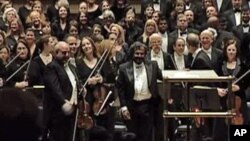George Mathew considers himself a member of a world of expanding identities.
Born in Malaysia to South Indian parents, he was only nine months old when his birthplace became a new country, Singapore. At the age of 12, his parents moved back to India and he became a naturalized Indian citizen. Now, several decades later, he is waiting for his American citizenship, his fourth but not the last of his list of multiple identities.
As a conductor of classical music, he also considers himself an ambassador for Central Europe’s music and art.
“I think of myself as living in a post-national world,” he says.
And now he has taken this attitude, mixed it with his passion, classical music, and embarked upon a journey of connecting communities around the world through charity concerts.
His latest one at New York’s Carnegie Hall, called “Beethoven for the Indus Valley,” was dedicated to the cause of restoring life to the areas devastated by the massive floods in Pakistan last year that destroyed the lives of over 20 million people.
Over 90 members of the orchestra, four soloists, and a choir of a 135 along with Mathew donated their time and musical talent for the people of a country that most of them had nothing to do with personally.
Some of them came from as far off as Montreal or Australia, at their own expense, to be part of this effort. Famous names like Glenn Dicterow, who has been the concert master of the New York Philharmonic for the last 30 years and performs as soloist every year, were happy to join Mathew whom they called “a visionary.”
Although these concerts follow a long tradition of using classical music for civic purposes, going as far back as Beethoven and Mozart themselves, the unique aspect of Mathew’s concerts is what he calls the “connection between the music and the cause.”
Musical inspiration
This idea came to him when he organized his first charity concert almost five years ago for the victims of the earthquake in South Asia. Incidentally, that concert was also Beethoven’s Ninth Symphony, something that he was working on at that time.
“Certain things jumped out,” explains Mathew, “there are places in it that were very relevant to the cause.”
He was particularly moved by two aspects of the symphony. One was the part of the text that said, “Seid umschlungen, Millionen!” or “Be embraced you millions,” and the other was the tune Beethoven sets during the last movement for his famous “Ode to Joy.”
Set as a kind of a German working class drinking song, the tune is supported by percussion from Turkish sources along with the provocative sounds of scimitars, swords clashing with each other. At a time when the Ottoman army was right outside the walls of Vienna, those sounds would have been uncomfortably familiar to his audience.
Beethoven was bringing “the music of the enemy, the feared, dangerous, eastern outsider into a place of embrace,” according to Mathew.
“I feel very strongly that at that moment, Beethoven stops being the voice of a single person,” he says, and becomes the voice of a whole civilization that yearns to embrace the other’s culture.
Concerts for causes
Feeling this call as worthwhile today as it was in 1820, Mathew sent out invitations to his fellow musicians who rushed to accept, and since then have answered his call again and again.
In the last five years, he has organized four concerts and now that he has formalized his efforts in the form of a new foundation called Music for Life International, more will certainly follow.




